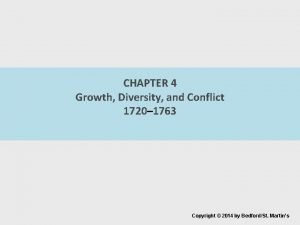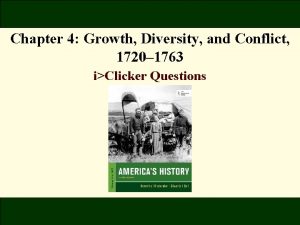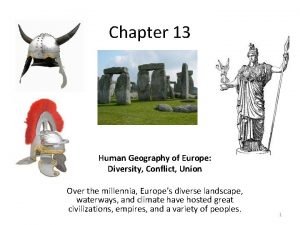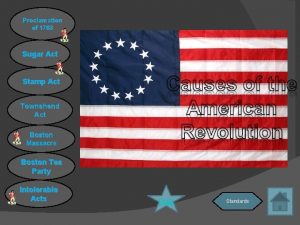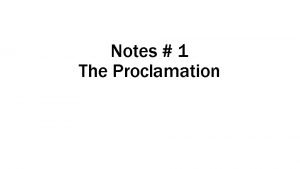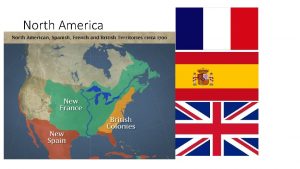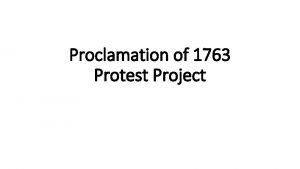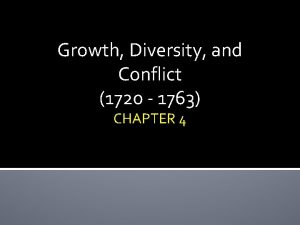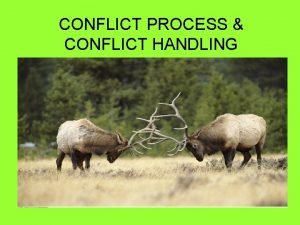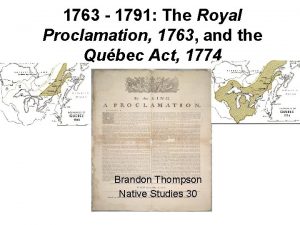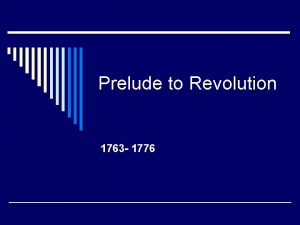Chapter 4 Growth Diversity and Conflict 1720 1763












- Slides: 12

Chapter 4: Growth, Diversity, and Conflict, 1720– 1763 i>Clicker Questions

1. To avoid the concentration of land ownership that characterized feudal England, New England colonists set out to create a yeoman society consisting primarily of whom? a. Redemptioners b. Freeholders c. Capitalists d. Planters

2. Marriage in New England under eighteenth-century English common law a. gave the husband legal ownership of the bride's land personal property. b. gave the wife the right to sell the family estate upon her husband's death. c. was a contract among equals. d. left the wife impoverished in the event of her husband's death.

3. What was the "household mode of production" used by farmers in New England? a. A system in which all town residents pooled their resources to build homes for new families b. An economic system that relied primarily on women in the home producing quilts and clothing c. A system in which every member of a household was assigned a specific job d. A system of community exchange in which families swapped labor and goods

4. Why did the number of printshops explode after 1695 in the English colonies? a. Gutenberg invented the printing press that year. b. The Glorious Revolution ended the era of royal censorship that year. c. Until then, colonists had lacked the skills to set up their own printing shops. d. The British government let the long-standing Licensing Act lapse.

5. What was the central premise of the Enlightenment? a. Devotion and piety were the way to experience God's grace in a conversion experience. b. Human reason had the power to observe, understand, and improve the world. c. An activist God was involved in the everyday affairs of the world. d. Everyone's mind was a blank slate on which basic ideas or principles could be imprinted.

6. What was the central legacy of the Great Awakening? a. The movement of religious authority from educated ministers to the believer's direct experience of God b. Continuing divisions between Old Lights and New Lights c. New emphasis on the importance of science in American society d. The view of God as a divine "watchmaker"

7. Why did the Baptist sect attract African Americans? a. White Baptists welcomed them to revivals with open arms. b. They were without spiritual beliefs and longed for religious instruction. c. The Baptist message declared all people to be equal in God's eyes. d. The Baptists criticized the Chesapeake planter elite.

8. Why did the British issue the Royal Proclamation of 1763? a. They were tired of Virginia speculators claiming western lands. b. They resented the practice of squatting. c. They wanted to prevent white–Indian conflict over the land. d. Britain wanted to issue a stern warning to France not to cross the colonies' western borders.

9. Which statement assesses the impact of the consumer revolution in the 1750 s and 1760 s? a. Wealth inequality decreased as a result. b. Farm prices dropped precipitously. c. American colonies sold less and less to England. d. American colonies incurred a trade deficit.

10. Why did North Carolina's debtors defy the authority of their government in 1766? a. They resented the Old Lights' control of the colonial assembly. b. They resented the government's failure to contain the Regulators. c. They claimed they suffered taxation without representation. d. They wanted to save their farms from creditors and tax officials.

Answer Key 1. The answer is b. 2. The answer is a. 3. The answer is d. 4. The answer is d. 5. The answer is b. 6. The answer is a. 7. The answer is c. 8. The answer is c. 9. The answer is d. 10. The answer is d.
 Growth diversity and conflict chapter 4
Growth diversity and conflict chapter 4 Chapter 4 growth diversity and conflict
Chapter 4 growth diversity and conflict Südsee seifenblase 1720
Südsee seifenblase 1720 Pluronic rpe 3110
Pluronic rpe 3110 Chapter 13 diversity conflict union
Chapter 13 diversity conflict union Genetic diversity and biodiversity
Genetic diversity and biodiversity Genetic diversity vs species diversity
Genetic diversity vs species diversity Proclamation of 1763 picture
Proclamation of 1763 picture What did the proclamation of 1763 forbid
What did the proclamation of 1763 forbid Proclamation of 1763
Proclamation of 1763 Pinckney's treaty
Pinckney's treaty Ohio river valley 1763
Ohio river valley 1763 Proclamation of 1763 protest
Proclamation of 1763 protest
